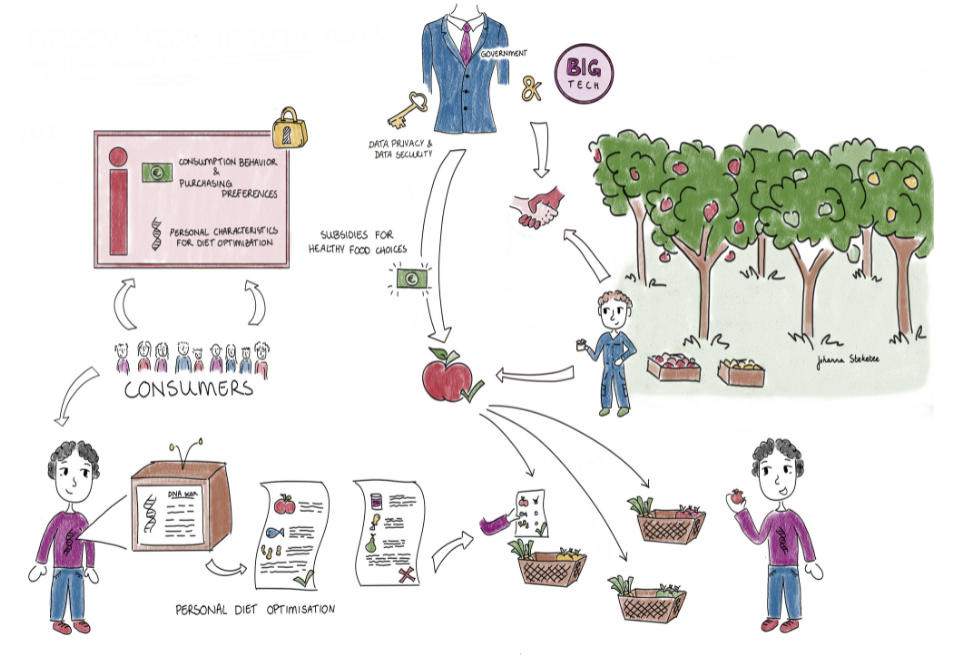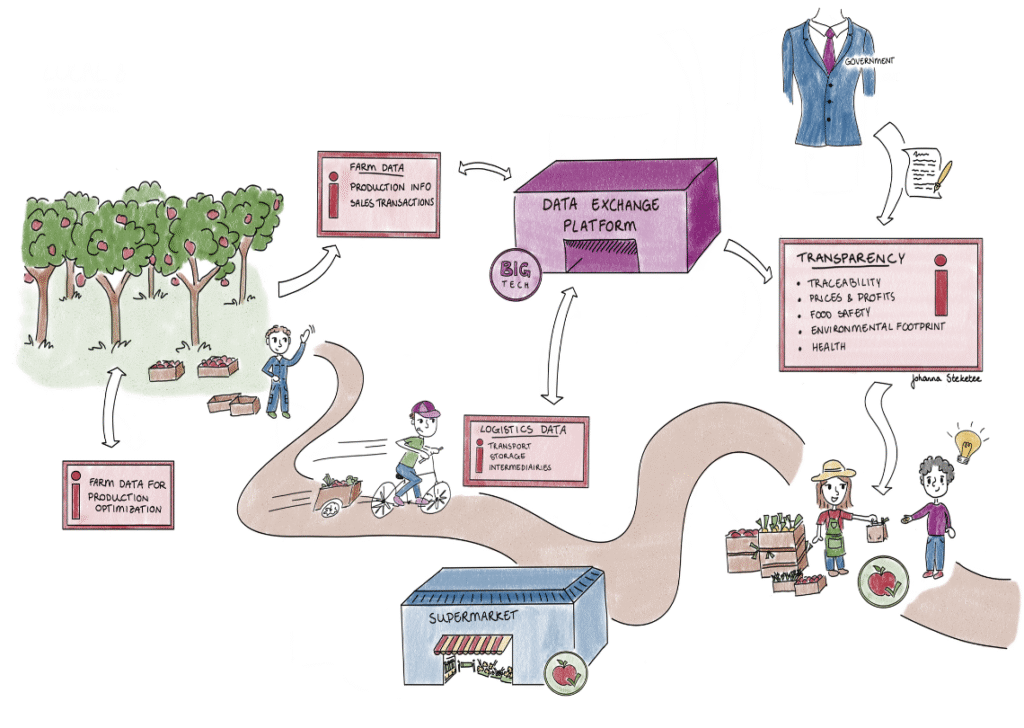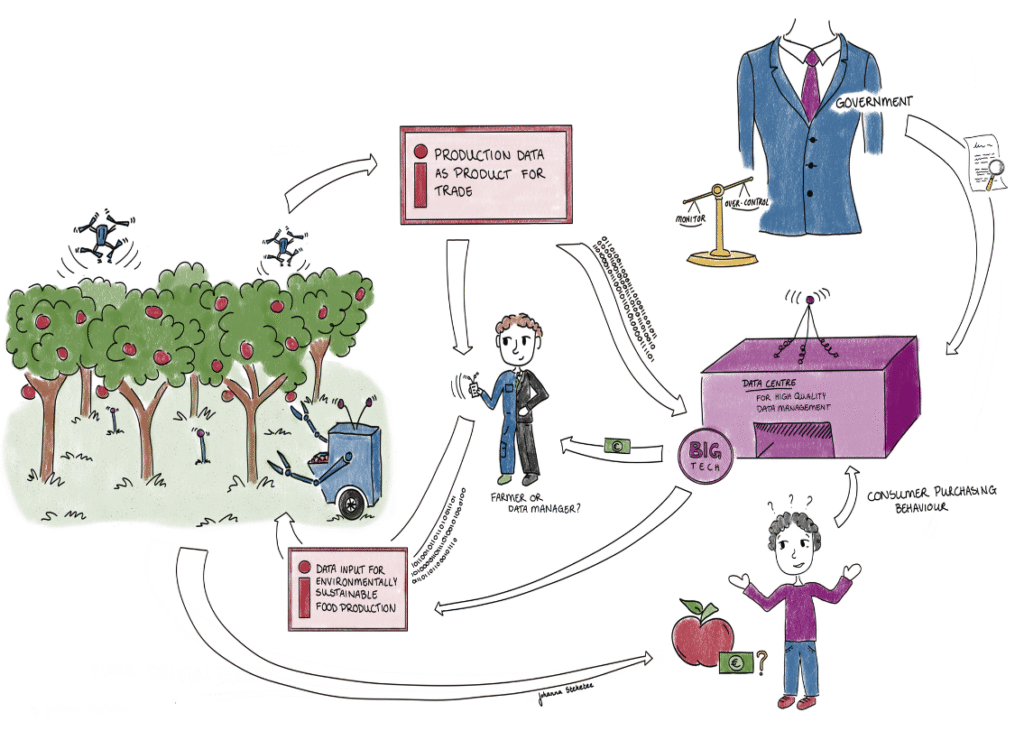Achieving a fair, inclusive, and innovative data economy requires understanding the challenges, opportunities, and trade-offs faced by diverse stakeholders. As part of the Data4Food2030 project, Wageningen University and Research (WUR) has conducted in-depth research on the future of the data economy for food systems (DE4FS), exploring how data can enhance sustainability, transparency, and resilience across Europe’s agri-food landscape.
To address this, WUR and project partners engaged stakeholders across Europe in a social, ethical, and legal back casting experiment, co-creating plausible future scenarios and pathways toward sustainable food systems. Two rounds of participatory workshops were held in six European countries (Spain, Belgium, Latvia, the Netherlands, Poland, and Slovenia). The first round identified narratives shaping possible futures of the DE4FS in 2050, which were synthesised into four EU-level scenarios. The second round refined these into three desirable scenarios and pathways to 2030, using Theory of Change (ToC) methods to map the actions and conditions needed to achieve fair and sustainable outcomes. The study presents three distinct yet interconnected scenarios:
Secure, consent-based use of personal data enables tailored nutrition. Educational initiatives and innovative business models support healthy diets, while farmers achieve sustainable livelihoods through data-driven demand insights.

Local value chains provide accessible, affordable, and healthy food, driven by informed consumers. Data sharing strengthens cooperation among value chain actors, enhances regional resilience, and ensures full traceability to reduce environmental impacts.

Precision agriculture and data-driven decision-making improve environmental performance and eliminate harmful practices. Strong governance ensures fair data practices, transparency, and interoperability, while new business models and collaboration across value chains secure viable livelihoods for farmers.

Together, these scenarios illustrate alternative yet complementary pathways toward a sustainable and equitable data economy for food systems. They highlight the importance of trust, collaboration, and robust governance in realising the potential of data to transform Europe’s food future.
Are you curious about how your food data is used? Do you think farmers should benefit more from data sharing? Or that transparency and fairness in the food system matter?
Take part in the Data4Food2030 survey and share your views on nine key dilemmas shaping the data economy for sustainable food systems. It only takes 15 minutes to help build a fair, inclusive, and innovative data economy for food systems!
Take the survey here:
For questions, please contact:
Kelly Rijswijk | Wageningen University and Research | 📧
For more information about the Horizon Europe Project Data4Food2030, please visit data4food2030.eu.
| Cookie | Duration | Description |
|---|---|---|
| cookielawinfo-checkbox-advertisement | 1 year | Set by the GDPR Cookie Consent plugin, this cookie is used to record the user consent for the cookies in the "Advertisement" category . |
| cookielawinfo-checkbox-analytics | 11 months | This cookie is set by GDPR Cookie Consent plugin. The cookie is used to store the user consent for the cookies in the category "Analytics". |
| cookielawinfo-checkbox-functional | 11 months | The cookie is set by GDPR cookie consent to record the user consent for the cookies in the category "Functional". |
| cookielawinfo-checkbox-necessary | 11 months | This cookie is set by GDPR Cookie Consent plugin. The cookies is used to store the user consent for the cookies in the category "Necessary". |
| cookielawinfo-checkbox-others | 11 months | This cookie is set by GDPR Cookie Consent plugin. The cookie is used to store the user consent for the cookies in the category "Other. |
| cookielawinfo-checkbox-performance | 11 months | This cookie is set by GDPR Cookie Consent plugin. The cookie is used to store the user consent for the cookies in the category "Performance". |
| CookieLawInfoConsent | 1 year | CookieYes sets this cookie to store the user consent. |
| elementor | never | This cookie is used by the website's WordPress theme. It allows the website owner to implement or change the website's content in real-time. |
| PHPSESSID | session | This cookie is native to PHP applications. The cookie is used to store and identify a users' unique session ID for the purpose of managing user session on the website. The cookie is a session cookies and is deleted when all the browser windows are closed. |
| viewed_cookie_policy | 11 months | The cookie is set by the GDPR Cookie Consent plugin and is used to store whether or not user has consented to the use of cookies. It does not store any personal data. |
| Cookie | Duration | Description |
|---|---|---|
| _ga | 1 year 1 month 4 days | The _ga cookie, installed by Google Analytics, calculates visitor, session and campaign data and also keeps track of site usage for the site's analytics report. The cookie stores information anonymously and assigns a randomly generated number to recognize unique visitors. |
| _ga_* | 1 year 1 month 4 days | Google Analytics sets this cookie to store and count page views. |